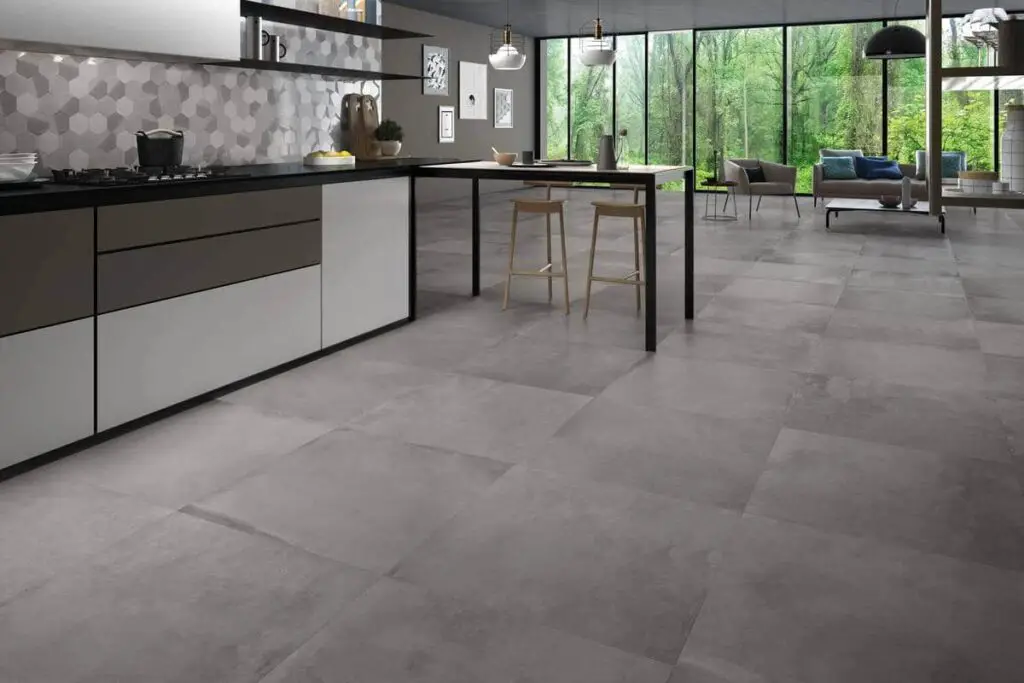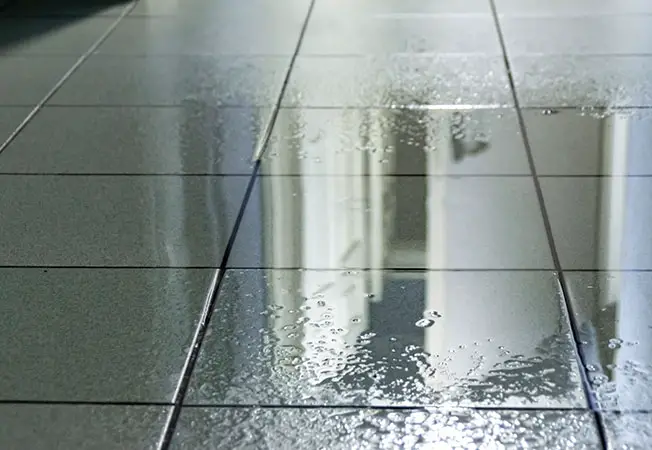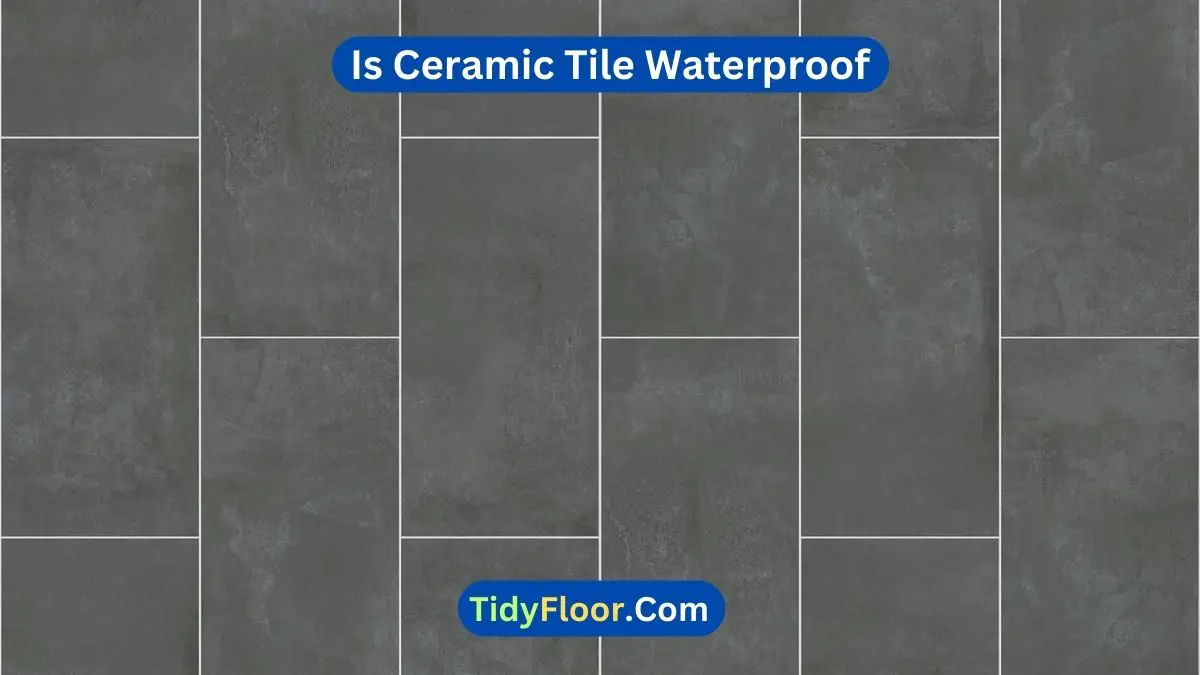Is ceramic tile waterproof? This question often arises among homeowners considering tile installations in wet areas like bathrooms and kitchens. While ceramic tiles offer durability and versatility, their inherent water resistance is a subject of inquiry.
Ceramic tiles themselves are not inherently waterproof. While they have a protective glaze, water can seep through grout lines. Proper sealing and installation techniques are necessary to enhance water resistance.
In this guide, I’ll discuss the factors influencing ceramic tile waterproofing. Also, you’ll explore the importance of ceramic tile waterproofing and more. So read the whole article to know more.
What Prevents Ceramic Tiles From Being Waterproof?

Ceramic tiles are the popular options among other tiles. But they are not so waterproof. So what prevents them from being waterproof will be discussed in this section.
#1- Composition:
Ceramic tiles are typically composed of natural materials such as clay, sand, and water. These materials inherently contain microscopic pores that can allow water to penetrate.
#2- Porosity:
Even after firing in a kiln, ceramic tiles retain some level of porosity. Microscopic pores within the tile structure can absorb water, making them susceptible to moisture infiltration.
#3- Surface Finish:
Glazed ceramic tiles have a protective glass-like coating applied to the surface. This glaze provides some water resistance. However, the underlying material can still absorb moisture if the glaze is compromised.
#4- Grout Lines:
The spaces between tiles are filled with grout, which is also porous. If not properly sealed, water can penetrate through the grout lines and reach the substrate beneath.
#5- Installation Quality:
Improper installation techniques, such as inadequate adhesive coverage or incorrect grout application, can compromise the waterproofing of ceramic tile installations. Poorly installed tiles may have gaps or uneven surfaces that allow water to seep through.
#6- Maintenance:
Over time, wear and tear, as well as lack of proper maintenance, can lead to damage to the tile surface or grout. Cracked or damaged tiles, as well as deteriorating grout, can compromise the waterproofing integrity of the tiled surface.
6 Importance Of Waterproofing In Ceramic Tiles
Discover the crucial role of waterproofing in ceramic tiles. Understanding the importance of waterproofing is essential for maintaining resilient and beautiful tile installations.
1- Prevention of Water Damage:
Waterproofing prevents water from seeping through tiled surfaces. Also, it protects underlying structures such as floors, walls, and subfloors from damage caused by moisture infiltration. This helps to maintain the structural integrity of buildings over time.
2- Mold and Mildew Prevention:
Moisture accumulation in areas like bathrooms and kitchens can create a conducive environment for mold and mildew growth. Waterproofing ceramic tiles helps to inhibit the growth of these harmful microorganisms. This promotes a healthier indoor environment and reduces the need for frequent cleaning and maintenance.
3- Durability and Longevity:
Proper waterproofing extends the lifespan of ceramic tile installations by shielding them from water-related damage. This includes warping, cracking, or deterioration of grout and adhesive. This ensures that tiled surfaces remain aesthetically pleasing and functional for years to come.
4- Enhanced Safety:
Waterproofing helps prevent slippery surfaces, particularly in wet areas like bathrooms and showers, reducing the risk of slips and falls. This is especially important in households with children, elderly individuals, or people with mobility issues.
5- Protecting Investments:
Tiled surfaces, especially in areas like bathrooms and kitchens, often represent significant investments in home construction or renovation projects. Waterproofing ensures that these investments are well-protected, preserving the value and appeal of the property.
6- Ease of Maintenance:
Waterproofed ceramic tile installations are easier to clean and maintain, as they are less prone to staining, mold growth, and water-related damage. This saves time and effort in routine maintenance tasks, contributing to a more convenient and hassle-free living environment.
Tips For Making Ceramic Tile Waterproof:
Here are a few tips for making water-prone ceramic tiles into waterproof.
Tip 1: Choose Glazed Ceramic Tiles
Glazed tiles have a protective coating. This coating helps repel water. It prevents moisture from soaking into the tile. Glazed tiles are easier to clean. They are more resistant to stains and spills. This makes them suitable for wet areas like bathrooms and kitchens. Glazed tiles come in various colors and patterns. Choose glazed tiles for improved waterproofing in your ceramic tile installation.
Tip 2: Properly Seal Grout Lines
Grout lines are porous. They can let water seep through. Use a high-quality grout sealer. Apply it to the grout lines between tiles. This seals the grout. It prevents water from penetrating. Properly sealed grout lines enhance waterproofing. They help protect the underlying structure. Regularly check and reapply grout sealer as needed. This ensures continued effectiveness in keeping the tiled area waterproof.
Tip 3: Use Waterproofing Membranes
Waterproofing membranes create a barrier. Apply them to the substrate before tiling. These membranes prevent water infiltration. They are especially important in wet areas. Bathrooms and kitchens benefit from them. Waterproofing membranes enhance tile waterproofing.
They add an extra layer of protection. Ensure proper application for maximum effectiveness. This helps maintain the integrity of the tiled surface over time.
Tip 4: Ensure Correct Installation
Proper installation is crucial. Use the right adhesive for tiles. Ensure tiles are evenly placed. Proper spacing between tiles is important. Follow manufacturer guidelines closely. Adequate adhesive coverage is necessary. It ensures tiles are firmly secured.
Remember, properly installed tiles minimize gaps. Gaps can let water penetrate. Correct installation enhances waterproofing. It ensures the tiled surface remains durable. Hire a professional if unsure. They ensure tiles are installed correctly.
Tip 5: Maintain Surface Integrity
Regular maintenance is key. Inspect tiled surfaces frequently. Look for cracks, chips, or damage. Repair any issues promptly. Damaged tiles compromise waterproofing. Replace damaged tiles as needed. Keep grout lines clean. Dirty grout can weaken waterproofing.
Regularly clean and seal grout lines. This preserves their integrity. Avoid harsh cleaning agents. They can damage tiles and grout. By maintaining surface integrity, you ensure long-lasting waterproofing for your ceramic tiles.
How To Choose The Ceramic Tiles For Wet Surfaces:

When choosing ceramic tiles for wet surfaces like bathrooms, kitchens, or outdoor areas, consider the following factors:
- Water Absorption Rating:
Look for tiles with a low water absorption rating, often labeled as non-porous or impervious. These tiles are less likely to absorb water and are more suitable for wet environments.
- Slip Resistance:
Select tiles with a textured or slip-resistant surface to prevent slips and falls, especially in areas prone to moisture. Look for tiles with a slip-resistant rating suitable for wet environments.
- Size and Grout Lines:
Choose larger tiles with minimal grout lines, as fewer grout lines mean less opportunity for water penetration. Larger tiles also create a smoother surface, making cleaning and maintenance easier.
- Porcelain vs. Ceramic:
Consider porcelain tiles, which are denser and less porous than traditional ceramic tiles. Porcelain tiles are more water-resistant and durable, making them ideal for wet areas.
- Color and Design:
Select colors and designs that complement the overall aesthetic of your space while also considering practicality. Lighter-colored tiles can make small spaces appear larger, while darker colors may show less dirt and grime.
- Durability and Maintenance:
Choose tiles that are durable and easy to maintain. Consider factors such as scratch resistance, stain resistance, and ease of cleaning when making your selection.
- Budget and Installation:
Determine your budget and consider the cost of both the tiles and installation. Keep in mind that investing in high-quality, waterproof tiles may save you money in the long run by reducing the need for repairs or replacements due to water damage.
Related Question
Can Water Pass Through Ceramic Tiles?
Ceramic tiles themselves are not porous. But water can pass through the grout lines between tiles. Grout is porous and can absorb water, allowing it to penetrate beneath the tiles. If the grout is not properly sealed, water can seep through and potentially cause damage to the underlying substrate.
Proper installation techniques, including sealing grout lines and using waterproofing membranes, help minimize water infiltration and ensure the effectiveness of ceramic tile installations in wet environments.
What Type Of Adhesive Should I Use For Waterproof Ceramic Tile Installations?
For waterproof ceramic tile installations, it’s crucial to use a high-quality waterproof tile adhesive. Look for adhesives specifically labeled as “waterproof” or “water-resistant.” These adhesives are designed to withstand exposure to moisture and provide a strong bond between the tiles and the substrate.
Further, consider using a flexible adhesive that can accommodate any movement or expansion in the tiled surface. Always follow the manufacturer’s instructions and recommendations for the specific adhesive you choose to ensure proper application and long-lasting waterproofing performance.
Are There Different Levels Of Water Resistance Among Ceramic Tiles?
There are different levels of water resistance among ceramic tiles. Tiles are categorized based on their water absorption rate, which determines their resistance to water. The classifications include non-vitreous, semi-vitreous, vitreous, and impervious. Non-vitreous tiles absorb the most water and are less suitable for wet areas.
On the other hand, impervious tiles absorb minimal water and are highly resistant to moisture. These make them ideal for use in bathrooms, kitchens, and other wet environments. It’s essential to choose tiles with an appropriate water absorption rating based on the intended application to ensure optimal performance and durability.
How Long Does Ceramic Tile Waterproofing Typically Last?
The longevity of ceramic tile waterproofing varies depending on factors such as installation quality, maintenance, and exposure to moisture. With proper installation and maintenance, ceramic tile waterproofing can last for many years.
However, over time, wear and tear, as well as exposure to harsh cleaning agents or heavy foot traffic, can degrade waterproofing. Regular inspection and resealing of grout lines are essential for maintaining waterproofing integrity and prolonging the lifespan of ceramic tile installations in wet environments.
Conclusion
So, Is ceramic tile waterproof or not? No, it’s directly not a waterproofing option. proper installation methods and maintenance can enhance their water resistance. Ceramic tile waterproofing protects surfaces in wet environments like bathrooms, kitchens, and showers. Proper installation techniques are crucial for creating a barrier against moisture infiltration. Regular maintenance helps ensure long-lasting waterproofing performance.


